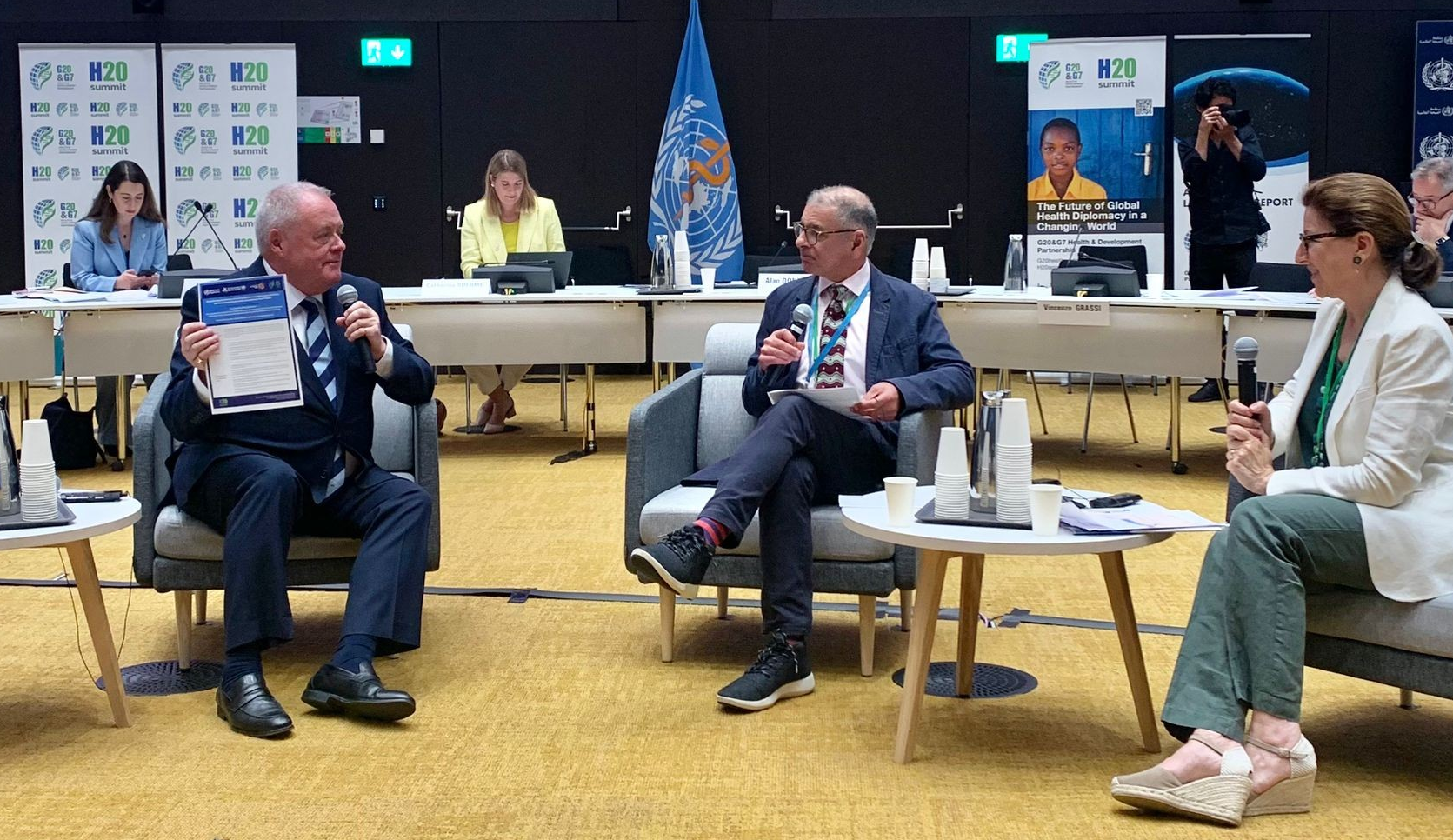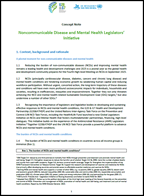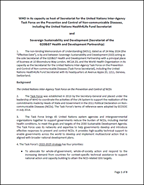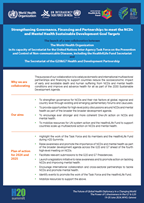Legislators initiative
NCD and mental health legislators’ report launched at the Health20 Summit, WHO, Geneva, 19 June 2025 and the eightieth UN General Assembly high-level week, 24 September 2025
Following a process that includes a set of hearings and submission of expert evidence, the global legislators report, NCDs and mental health conditions: a threat to health and a threat to wealth – a model resolution for legislators was launched at the 2025 Health20 Summit and during the eightieth UN General Assembly.
Written by legislators for legislators, the report was spearheaded by the G20 & G7 Health and Development Partnership, the UN NCD Task Force Secretariat and UNDP, with the support of other development partners including IDLO, WHO, the World Bank, the NCD Alliance, and other multilateral, academic, civil society and relevant private sector entities.
The launch events brought together legislators from all parts of the world, alongside ministers, UN agencies, civil society and other development partners to highlight the crucial role of legislators in responding to NCDs and mental health conditions.
Fiscal, legislative and regulatory action are front and centre of the 2025 political declaration on NCDs, mental health and wellbeing. And delivering the commitments set out in the political declaration will require strong leadership and action from legislators.
The G20 & G7 Health and Development Partnership, the UN NCD Task Force Secretariat and UNDP are now developing a programme of support to help international, national and local legislative bodies implement the report’s recommendations.
There is an urgent need for collective action against NCDs and mental health challenges, with a greater emphasis on low-income countries due to the disproportionate impact of such issues. Legislators’ engagement is necessary in bringing the relentless growth of NCDs and mental health challenges under control - Hon Dr Christopher Kalila, co-author of the report, Chair of Health Committee, Zambia and Chair of the Commonwealth Parliamentary Association
This has to be one of the most important and exciting reports on NCDs and mental health published this year. The model resolution includes a toolkit for action. Implementing those actions will be a real game-changer - Nick Banatvala, Head of Secretariat, UN NCD Task Force

Global Legislators Report

New legislators’ initiative announced at the H20 between UN NCD Task Force and G20&G7 Health and Development Partnership

A bold an exciting new collaboration was announced on 19 June 2024 at the start of the 2024 H20 meeting in Geneva, between the G20&G7 Health and Development Partnership and the UN Inter-Agency Task Force and Health4Life Fund to catalyze domestic and international multisectoral partnerships and scale up financing to support countries reduce the socioeconomic impact of NCDs and mental health conditions.
The Task Force and G20&G7 Health and Development Partnership will work together to strengthen governance for NCDs and mental health and their risk factors at global, regional and country level through existing and emerging parliamentary forums and caucuses. The collaboration will provide space for high-level policy discussions around NCDs and mental health as part of the broader development agenda, as well as promoting an ever stronger and more coherent One-UN action on NCDs and mental health. The G20&G7 Health and Development Partnership will also support efforts to mobilize resources for UN system action and the Health4Life Fund to support countries scale up multisectoral action on NCDs and mental health.
In the first instance, the collaboration will develop an initiative to encourage legislators to raise awareness, be involved in and actively promote action to tackle NCDs and improving mental health.
‘This seminal legislators initiative could not be more timely given next year’s dedicated meeting to NCDs and mental health at the United Nations General Assembly’ said Alan Donnelly, Chair of the G20&G7 Health and Development Partnership, at today’s meeting held at the World Health Organization.
‘Today here at the H20, the G20&G7 Health and Development Partnership launched a report on antimicrobial resistance, that we have developed across the 56 parliaments of the Commonwealth, the 57 parliaments in the Francophonie, and with members of the European Parliament. This will encourage national and regional parliaments to take action on antimicrobial resistance. We now turn our attention to NCDs and mental health’, Donnelly added.
‘We believe that legislators have a crucial role in leading action on NCDs and improving mental health’ Hatice Beton, Chief Executive of the G20&G7 Health and Development Partnership said. ‘The costs of these diseases and conditions to the global economies will have run into trillions of dollars by the end of the decade. It’s going to be impossible to meet a large number of SDG targets and therefore achieve the 2030 Sustainable Development Agenda if we don’t sort out NCDs and mental health conditions’ Beton emphasized.
Nick Banatvala, Head of the Task Force and Health4Life Secretariat outlined why legislators are crucial to an effective response, ‘Many of the most effective interventions for tackling NCDs such as taxing and reducing access and availability of unhealthy products require regulatory, fiscal and legislative action – which of course are the responsibilities of parliamentarians’, before adding, ‘Legislators have a crucial role to hold governments account for delivering health service and promoting local action in the community. ‘Working with G20&G7 Health and Development Partnership with provide us with unparalleled experience, expertise and networks to move this agenda forward’, he said.
Donnelly, who moderated last month’s World Health Assembly’s Health4Life side event ministerial segment, is clear that this collaboration has huge potential. ‘Working with the Task Force, we will be able to raise awareness and promote the importance of NCDs and mental health as part of the broader development agenda across the G20 and G7 ahead of the fourth high-level meeting on NCDs next year and beyond.’
The two-day 2024 H20 summit was held on 19–20 June 2024.

Concept note for the legislators’ initiative

Memorandum of Understanding

